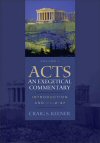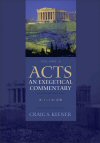Acts: An Exegetical Commentary (vols. 1 & 2)
Digital Logos Edition
Overview
Highly respected New Testament scholar Craig Keener is known for his meticulous and comprehensive research. This commentary on Acts, his magnum opus, is one of the largest and most thoroughly documented Acts commentaries available. This work sets Acts in its first-century context making it useful for the study of early Christianity as well as biblical text. This collection includes the first two volumes of Keener’s multivolume commentary on Acts; the remaining volumes have yet to be released. This magisterial work is a valuable resource for New Testament professors and students, pastors, Acts scholars, and libraries.
The Logos Bible Software edition of this collection is designed to stimulate your study and understanding of Acts. Scripture passages link directly to your preferred English translation and original language texts; important theological concepts link to dictionaries, encyclopedias, and a wealth of other resources in your digital library. In addition, you can perform powerful searches by topic to find what other authors, scholars, and theologians have to say about the apostles and the ancient church.
This title is included in the following collections
You can save when you purchase this product as part of a collection.
Acts: An Exegetical Commentary...
$269.99$269.99Craig Keener New Testament Com...
$509.94$282.09Baker Ultimate Collection 2022...
$38,273.89$30,599.99

- Offers a socio-historical reading of Acts
- Includes over 2,000 pages of verse-by-verse commentary
- Considers modern scholarship as well as ancient materials for a comprehensive examination of Acts
Top Highlights
“but thinks that Luke apparently ‘makes no attempt to call it to his readers’ mind.’” (Page 842)
“The early church’s demonstrated capacity for, and interest in, memory, though not inviting us to think of verbatim recall of sayings, do lead us to expect that they preserved the basic ideas of their early leaders (just as they preserved Paul’s letters); thus it is reasonable to surmise that Luke had access to elements of the ‘primitive’ apostolic message.” (Page 296)
“This commentary’s primary focus is what the text meant to its first audience. Its primary contributions lie in often providing further documentation for, and sometimes further elaboration of, the social and historical framework in which Acts was first written, read, and heard.” (Page 4)
“Thus tongues are a sign of prophetic empowerment for the continuing cross-cultural mission.” (Page 824)
“When we test Luke’s historical accuracy, it should be admitted at the outset (at least once we have surveyed the range of writings included in the genre of ancient historiography) that Luke and his contemporaries exercised more liberty in details than we would grant modern historians, although we employ (perhaps slightly anachronistically) the same term for both the ancient genre and its modern counterpart. Ancient historians were concerned with producing cohesive and instructive narrative, not simply recitation of available events or discussion of bare information.” (Page 28)
Keener takes very seriously the claim of the book of Acts to be historiography. His encyclopedic knowledge of ancient literature and his intelligent skill as an exegete make this a magisterial commentary.
—Richard Bauckham, professor emeritus of New Testament studies, University of St. Andrews
Somewhat surprisingly, a socio-historical approach to Acts still needs to be defended and its value demonstrated. No one does this better—is more informed about ancient literature, parallels, and precedents, and more interactively and fruitfully engaged with contemporary literature and issues—than Craig Keener. For anyone wanting to appreciate how Acts ‘worked’ in its original context and to get into the text at some depth, Keener will be indispensable and ‘first off the shelf.’
—James D. G. Dunn, Emeritus Lightfoot Professor of Divinity, University of Durham
With a monograph-level introduction and solid, detailed use of background sources, Craig Keener has provided us with a rich gem of a commentary on Acts. One can use it and get a real sense of what this key work is all about.
—Darrell L. Bock, senior research professor of New Testament studies, Dallas Theological Seminary
This is the most expansive treatment of Acts in modern scholarship. Keener offers the reader a sweeping tour of the relevant ancient material and modern scholarship on Acts. He takes Acts seriously as a work of ancient history; at the same time, he is aware of the literary and rhetorical dimensions of the text.
—Gregory E. Sterling, Lillian Claus Professor of New Testament, Yale Divinity School
- Title: Acts: An Exegetical Commentary
- Author: Craig S. Keener
- Publisher: Baker Academic
- Volumes: 2
- Pages: 2,288
- Acts: An Exegetical Commentary, vol. 1: Introduction and 1:1–2:47 by Craig S. Keener
- Acts: An Exegetical Commentary, vol. 2: 3:1–14:28 by Craig S. Keener

In this volume, Keener introduces the book of Acts, particularly historical questions related to it, and provides detailed exegesis of its opening chapters. He offers a wealth of fresh insights based on an unparalleled range of ancient sources.
This first volume promises to be the inaugural component of the most comprehensive commentary on Acts to date. Keener presents a socio-historical reading of the text with meticulous precision, and his knowledge of scholarly research is impressive. The book of Acts is read as a historiographical work in which its author rewrites traditions; the documentation from ancient Jewish literature is exceptionally rich. Keener treats hermeneutical issues and the historical reliability of the text astutely and clearly. From now on, any exegesis of Acts will need to take into account this major work.
—Daniel Marguerat, professor of New Testament, University of Lausanne, Switzerland

Acts: An Exegetical Commentary, vol. 2: 3:1–14:28
- Author: Craig S. Keener
- Publisher: Baker Academic
- Publication Date: 2013
- Pages: 1,200
In this volume, Keener continues his detailed exegesis of Acts, utilizing contextual information and offering wisdom about the text itself.
A magnificent achievement. This volume continues in the same vein as the first, with superbly detailed exegesis of the text as well as many helpful excursuses on more general topics of interest—with a wealth of material to back up all the claims made. Without any shadow of doubt, an indispensable reference work for all students of Acts and early Christianity.
—Christopher M. Tuckett, professor of New Testament studies, Pembroke College, University of Oxford
Reviews
19 ratings
Glenn Crouch
3/19/2025
A superb start to the 4-volume work on Acts. The Author supplies a huge amount of background information that I've found invaluable for sermon and bible study preparation (and not just those that are on Acts). Highly recommended. Now, onto Vol 3!Thai Lam
5/31/2022
Philip Chackochen
5/1/2020
Ray Brown
7/24/2017

Marco Ceccarelli
1/26/2017
The 4 books are indisputably unvaluble. But ... why Logos didn't set them toghether since, moreover, the pages number runs continually from the first to the fourth? I hope someone will fix itWonderer
1/16/2016
Anthony Sims
5/14/2015
- Excellent introductory work while remaining very readable.

Gary Shogren
3/15/2015
The hard copy version comes with a DVD. Is this provided in the Logos version?Mark Keith Hillis
2/19/2015
One of the most thorough and reliable evangelical scholars I've read. Very much appreciated.